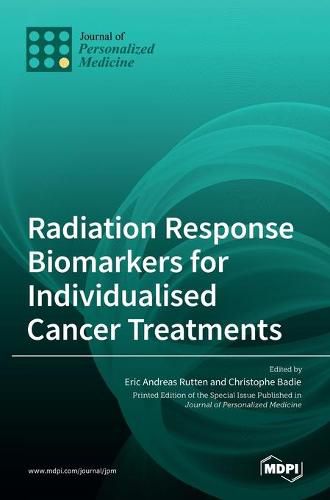Readings Newsletter
Become a Readings Member to make your shopping experience even easier.
Sign in or sign up for free!
You’re not far away from qualifying for FREE standard shipping within Australia
You’ve qualified for FREE standard shipping within Australia
The cart is loading…






This title is printed to order. This book may have been self-published. If so, we cannot guarantee the quality of the content. In the main most books will have gone through the editing process however some may not. We therefore suggest that you be aware of this before ordering this book. If in doubt check either the author or publisher’s details as we are unable to accept any returns unless they are faulty. Please contact us if you have any questions.
Personalised medicine is the next step in healthcare, especially when applied to genetically diverse diseases such as cancers. Naturally, a host of methods need to evolve alongside this, in order to allow the practice and implementation of individual treatment regimens. One of the major tasks for the development of personalised treatment of cancer is the identification and validation of a comprehensive, robust, and reliable panel of biomarkers that guide the clinicians to provide the best treatment to patients. This is indeed important with regards to radiotherapy; not only do biomarkers allow for the assessment of treatability, tumour response, and the radiosensitivity of healthy tissue of the treated patient. Furthermore, biomarkers should allow for the evaluation of the risks of developing adverse late effects as a result of radiotherapy such as second cancers and non-cancer effects, for example cardiovascular injury and cataract formation. Knowledge of all of these factors would allow for the development of a tailored radiation therapy
regime. This Special Issue of the Journal of Personalised Medicine covers the topic of Radiation Response Biomarkers in the context of individualised cancer treatments, and offers an insight into some of the further evolution of radiation response biomarkers, their usefulness in guiding clinicians, and their application in radiation therapy.
$9.00 standard shipping within Australia
FREE standard shipping within Australia for orders over $100.00
Express & International shipping calculated at checkout
This title is printed to order. This book may have been self-published. If so, we cannot guarantee the quality of the content. In the main most books will have gone through the editing process however some may not. We therefore suggest that you be aware of this before ordering this book. If in doubt check either the author or publisher’s details as we are unable to accept any returns unless they are faulty. Please contact us if you have any questions.
Personalised medicine is the next step in healthcare, especially when applied to genetically diverse diseases such as cancers. Naturally, a host of methods need to evolve alongside this, in order to allow the practice and implementation of individual treatment regimens. One of the major tasks for the development of personalised treatment of cancer is the identification and validation of a comprehensive, robust, and reliable panel of biomarkers that guide the clinicians to provide the best treatment to patients. This is indeed important with regards to radiotherapy; not only do biomarkers allow for the assessment of treatability, tumour response, and the radiosensitivity of healthy tissue of the treated patient. Furthermore, biomarkers should allow for the evaluation of the risks of developing adverse late effects as a result of radiotherapy such as second cancers and non-cancer effects, for example cardiovascular injury and cataract formation. Knowledge of all of these factors would allow for the development of a tailored radiation therapy
regime. This Special Issue of the Journal of Personalised Medicine covers the topic of Radiation Response Biomarkers in the context of individualised cancer treatments, and offers an insight into some of the further evolution of radiation response biomarkers, their usefulness in guiding clinicians, and their application in radiation therapy.